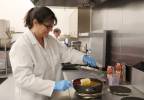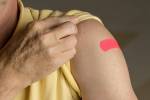Danger of food-borne illness easy to wash away
Summer heat tends to exacerbate the risk of food-borne illness, because whether you’re planning a picnic or just a routine trip to the supermarket, it’s far more difficult to keep cold things safely cold, leading to coolers and insulated bags and a whole lot of logistical strategizing.
But what experts cite as their primary precaution for ensuring food safety is probably also the most basic:
Wash your hands.
“That’s the No. 1 way to prevent food-borne illness,” said Damon McCune, registered dietitian nutritionist, licensed dietitian and graduate assistant at the University of Nevada, Las Vegas.
Christine Bruhn, who retired just last week as director of the Center for Consumer Research at the University of California, Davis, and continues in the school’s department of food science and technology, recently authored a study in which 120 people were videotaped preparing chicken in their homes. While 85 percent of them, she said, were confident that they knew proper safe-handling procedures, 64 percent did not wash their hands before beginning meal preparation, and of those who did, one-third did not use soap.
Also, she said, 38 percent of them touched raw chicken and then touched other things — their face, a refrigerator handle, a mobile phone — which greatly increased the likelihood of what Bruhn called “rampant” cross-contamination.
“Salmonella can survive in these variety of environments,” said Bruhn, who’s a spokeswoman for the Institute of Food Technologists.
So, let’s take a look at the guidelines from the Centers for Disease Control and Prevention, which says to wash your hands:
■ Before, during and after preparing food.
■ Before eating food.
■ Before and after caring for someone who is sick.
■ Before and after treating a cut or wound.
■ After using the toilet.
■ After changing diapers or cleaning up a child who has used the toilet.
■ After blowing your nose, coughing or sneezing.
■ After touching an animal, animal feed or animal waste.
■ After touching garbage.
It’s not enough to rinse them quickly under the faucet or pull out the bottle of hand sanitizer. Proper washing, according to the CDC, involves wetting your hands with warm or cold water, lathering them with soap, scrubbing your hands (including the backs, between your fingers and under the nails) for 20 seconds — sing “Happy Birthday” twice, or, McCune suggested, say the alphabet twice — rinsing under running water and drying with a clean towel, or air drying
(It’s worth noting here that, in a separate study of burger preparation, UC-Davis researchers found people washed their hands for only 2 seconds, which, Bruhn said, ,is “just getting your fingers wet.”)
Sanitizers don’t clean hands adequately for food safety, McCune noted.
“The sanitizer is kind of just moving the bacteria around and moving the dirt around,” he said. “It won’t necessarily lift it off your hands. The soap is kind of doing the same thing as the antibacterial wash, but when you’re vigorously rubbing and rinsing, you’re washing away all the bacteria.”
Hand-washing is something that’s always important, but Robert Urzi, an environmental health supervisor with the Southern Nevada Health District, said summer provides additional, unique challenges for food safety. The high heat, for instance, makes it easier for foods to rise to dangerous temperatures.
And barbecuing or grilling add even more, he added; cross-contamination is common when one plate is used to take chicken or meat to the grill, and then the cooked, ready-to-eat food is put on the same plate.
“You introduce bacteria back into the product,” Urzi said.
If you marinate, he noted, discard the marinade when you cook the meat; make a fresh batch, if desired, for serving.
It’s important to ensure that barbecued and grilled meats are cooked thoroughly. Urzi said that means 165 degrees for chicken, to reduce the risk of salmonella, and 155 degrees for ground beef, to reduce the risk of e. coli.
Bruhn said one of the surprises that came out of the UC-Davis study was that people undercooked their chicken. She said participants tested their chicken with a scientifically calibrated thermometer and 40 percent were below the recommended 165 degrees.
For people who grilled their chicken, she said, the disparity was even higher, with 52 percent at less than 165 degrees.
“The average was 18 degrees below, probably because when grilling, it’s more difficult to control the heat,” Bruhn said.
“They were using appearance, and that’s the issue,” she continued. “Appearance is not an adequate indicator.”
In some cases, neither were the participants’ thermometers. Some were off by only a few degrees, which she said is not a problem, but some were as much as 30 to 40 degrees off.
The solution is to check your thermometer by dunking it in ice water and seeing if it’s at 32 degrees Fahrenheit. That test is more accurate than using boiling water, Bruhn said, since altitude can affect boiling points.
While preparing chicken, resist the urge to wash it before cooking, Bruhn said. When you cook it to 165 degrees, you’ll kill the bacteria the chicken may contain. But washing raw chicken can spread bacteria around the kitchen — maybe to fresh produce, or food-preparation surfaces or utensils — leading to cross-contamination.
Food-safety myths are, it seems, numerous and in some cases tenacious. McCune said a common misconception is that organic produce doesn’t contain bacteria and won’t spoil.
“Just because it’s organic doesn’t mean it won’t spoil; in fact, it may spoil faster,” he said.
And, if you think produce — any produce — is safe from risk of salmonella or e. coli, you’re mistaken.
“The outside of the fruits and vegetables get contaminated with water that has the salmonella or fecal matter in it,” Urzi said. “Bacteria will dry on the outside of the fruit or vegetable. If you don’t wash it, you can introduce that pathogen.”
“Some people believe that vegetarians will never get food-borne illness,” Bruhn said. “Regretfully, that’s not true. Because we’re eating more produce, there have been more illnesses related to produce than there have been to chicken or beef. You need to take care on everything you eat.”
And Bruhn said special solutions for cleaning your produce aren’t necessary.
“Water works as well,” she said. “Wash under running water, and if appropriate (you wouldn’t want to do this with something delicate like raspberries, she said), gently rub the item with your fingers.”
Summer food safety simply involves some common sense. McCune said if you’re going grocery shopping, make sure the supermarket is the last stop. Carry a cooler if you can, with either ice or ice substitutes, but don’t fill it so much that you can’t close it.
Urzi said to plan your route through the grocery store with a thought to food safety, getting things like eggs, meat and dairy products right before you head to the checkout.
“They’re potentially hazardous foods, especially your raw meat,” he said. “As it warms up, especially in the summer heat where you have to transport those home in your car, it’s important to keep them cold as long as possible.”
He suggested double-bagging meat so it doesn’t leak on other foods (and remember not to stack fresh meat above ready-to-eat foods in the refrigerator, Bruhn said, in case of leakage).
When picnicking or camping, keep food in one cooler and drinks in another, since people probably will be going into the drinks cooler more often, McCune said.
Avoid other common myths. If food has begun to spoil, no amount of heating will salvage it, McCune said.
Bruhn said tasting a questionable food to see if it’s safe doesn’t work; “spoilage bacteria and bacteria that make you ill are different.”
If you’re refrigerating a big batch of food, be sure to move it into flatter containers so the food is no more than 2 or 3 inches thick, to ensure safe cooling, she said.
But don’t worry too much about mayonnaise — at least commercial mayonnaise.
“Mayonnaise is not a food-safety hazard in itself,” Bruhn said. “If people become ill from potato salad or something, it may be the washing and the sanitation in the kitchen was not as great as it should have been. It’s not the problem with the mayonnaise; it’s the problem with all the handling.”
Refrigerate eggs in their cartons, she said, because they’ll stay fresher, and you have a date on the carton to let you know how old they are.
Oh, and one more thing, just in case you missed it:
“Dirty hands are one of the most common ways for illnesses to spread on foods,” Urzi said.
“Make sure you wash your hands.”
Contact reporter Heidi Knapp Rinella at hrinella@reviewjournal.com or 702-383-0474.




























